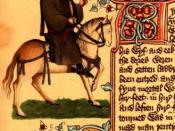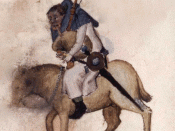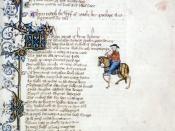Marriage is an institution viewed upon in many different ways. Some people believe it is a holy union of two people in order to reproduce. On the other hand, there are those who look at it as a social contract which often binds two people that are not necessarily right for each other. In Geoffrey Chaucher's The Canterbury Tales, the view taken is that of the former. Chaucher looks at marriage as an obligation that is almost always dominated by one of its two members, as view proven in the Miller's Tale, the Shipman's Tale, the Merchant's Tale, and the Wife of Bath's Tale.
The "Shipman's Tale" exemplifies the sarcastic view of marriage taken by Chaucer. Here, his wife along with his cousin, Sir John the monk, cuckolds a noble merchant. The merchant is completely trusting of his wife and his cousin, but still they take advantage of him.
Money is the underlying theme in this tale. First, Sir John asks the merchant if he'd "contrive to lend [him] a hundred francs" (Chaucer, 164) which would actually be used to seduce the merchant's wife. The merchant gladly loans him the money; not knowing his cousin had ulterior motives. Then, the merchant leaves on a business trip and leaves his wife alone in their home, along with the monk. With the merchant never once questioning their honor, the wife and the monk take advantage of his leave in order to consummate their relationship. Although later the wife almost gets caught, ultimately her husband never learns that his wife has lied in anyone's "arms all night" (Chaucer, 165) that weren't his and the merchant is seen as a blind fool. The relationships in this tale are all defined, at least in part, in terms of finances:
"The wife defines...



Good Job!
This essay has been very well done, just make sure you watch out for passive voice words, suchas is-were-was-when-be-been-being... all those words can make an essay sound boring; hence "passive voive" not "active voice"!
0 out of 0 people found this comment useful.